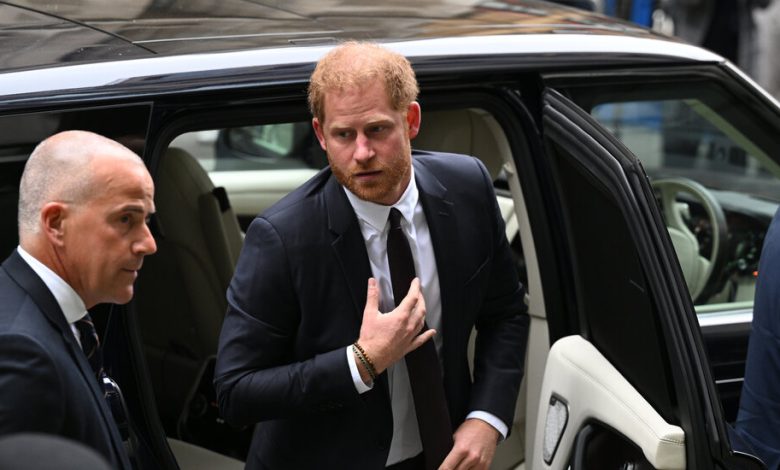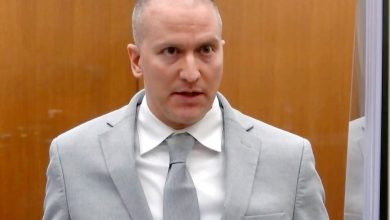Prince Harry, in Dramatic Testimony, Says Journalists Have ‘Blood on Their Hands’

Prince Harry finally got his day in court against the British tabloid press that he has long reviled, taking the stand in London on Tuesday to accuse the Mirror Newspaper Group of hacking his cellphone more than a decade ago.
Through five hours of polite but persistent grilling, Harry stood by his claims that the Mirror Group’s reporters intercepted his voice mail messages and used other unlawful means to dig up personal information about him, creating an atmosphere of distrust and even paranoia that has shadowed him since childhood.
It was a spectacle both extraordinary and ordinary: Harry, 38, the second son of King Charles III and the first prominent royal to testify in more than a century, declared that editors and journalists “have blood on their hands” because of the lengths to which they went to ferret out news about him and his family, not least his mother, Diana, who died in a car crash in 1997 after being pursued by photographers.
Yet for all the celebrity of the plaintiff, the scene in the packed High Court took on the rhythms of any other legal proceeding, as Harry’s cross-examination got underway. A lawyer for the Mirror Group, Andrew Green, repeatedly pressed him for hard evidence that its journalists had hacked his phone. Much of the information that Harry said was illegally obtained was available from other sources, the lawyer argued.
Harry, speaking in modulated and measured tones, insisted there was no way the Mirror’s reporters could have so quickly discovered his whereabouts, or the details of a schoolyard injury, without resorting to illegal methods.
“Are we not in the realm of total speculation?” Mr. Green said to Harry about his theory that the Mirror had hacked his doctor’s phone to obtain details about a thumb he broke while a student at Eton College.
“No,” Harry replied, adding, “I’m not the one who wrote the article, so you will have to ask the journalist who wrote the article.”
Still, there were also dramatic moments when Harry was able to make a broader point about how the tabloid press treats people like him. Asked by Mr. Green if the public had an interest in knowing about his youthful drug use — an issue extravagantly covered in the pages of The Daily Mirror — Harry shot back: “There’s a difference between public interest and what interests the public.”
There were other clear signs that Harry was no ordinary plaintiff. Photographers and camera crews jostled outside the court as he arrived. As he took his place on the stand, lawyers caucused briefly over how to address the witness, who also goes by the title Duke of Sussex. They settled on Prince Harry.
Harry is one of four plaintiffs in this case, one of only two civil suits rooted in the phone hacking scandal of 2011 that has made it all the way to trial. He is the first senior royal to testify in court since 1891, when the Prince of Wales, the future Edward VII, testified in the case of a man accused of cheating at a game of baccarat.
For the prince, whose reputation in Britain has been tarnished by his bitter rupture with the royal family, the trial was a rare opportunity to take a stand against a news media that has its own checkered reputation. Beyond the charges in the case, Harry views the trial as a platform to call for a sweeping reform of the British press.
In written testimony submitted by his lawyers, Harry said the state of the British press, like that of the British government, was at “rock bottom.” His blunt comment was yet another precedent-shattering move: Royals, by custom, never wade into political commentary.
To prevail on the legal case, however, Harry will have to convince the judge, Timothy Fancourt, that the Mirror Group intercepted his voice mail messages and those of people close to him, and used other unlawful means to gather information. Proving hacking could be a high bar, given how much time has passed since the Mirror articles cited by Harry were published.
In a filing, Harry’s lawyers wrote that he often experienced “suspicious” activity on his phone, including missed calls or hangups, from numbers he did not recognize or that were concealed. But the lawyers conceded that after so many years, he could not recall the dates on which this activity occurred.
The Mirror denies that it hacked Harry’s phone, or those of the three other plaintiffs, though it admitted in 2014 that it had hacked other public figures and publicly apologized for it the following year. It has conceded unlawfully obtaining information via a private investigator, and said that warranted some compensation to the plaintiffs, though neither side has floated a figure for monetary damages.
In addition to Harry, they are Nikki Sanderson and Michael Taylor, who both appeared in the popular TV series “Coronation Street,” and Fiona Wightman, the former wife of a well-known comedian, Paul Whitehouse.
Lacking irrefutable evidence of hacking, Harry’s lawyers, led by David Sherborne, are relying heavily on inference. They have submitted, as evidence, 147 articles published by Mirror tabloids that contain information that they claim could only have been obtained through illegal means, either because of the private nature of the material or because only a small circle of people knew about it.
But the Mirror Group’s lawyers countered that the details in those articles could have come from other legitimate sources. Beyond that, they argue that Harry waited too long to file the lawsuit, noting that the alleged misconduct occurred between 1991 and 2011.
Harry is expected to continue testifying for several more hours on Wednesday. With the other plaintiffs and Jane Kerr, a former royal reporter for The Mirror, also scheduled to testify in coming days, the trial is expected to last a few weeks.
Most of the exchanges on Tuesday focused on the origins of the articles submitted by Harry’s lawyers. Mr. Green tried to argue that the information was either supplied by aides in Buckingham Palace or already in the public domain.
On the report about Harry breaking his thumb, for example, the Mirror’s lawyer argued that it was readily available. But Harry pointed to specific details in the Mirror story attributed to a doctor.
“Not only do I have no idea how they would know that, but those sorts of things instill paranoia in a young man,” Harry said, adding that it was possible his doctor’s phone had been hacked to obtain the information (the doctor is not expected to testify).
In the reports about his drug use, Mr. Green cited a passage from Harry’s memoir, “Spare,” in which he recalled that aides in his father’s office had decided to cooperate with the tabloids in reporting the story.
Perhaps inevitably, Harry’s love life also figured in the testimony. The prince said he believed The Daily Mirror used a technique known as “blagging” — in which deceptive methods are used to obtain personal information — to access the flight records of one of his former girlfriends, Chelsy Davy, for a trip the couple made to Mozambique.
Harry, who has said intrusive coverage contributed to his breakup with Ms. Davy, referred to an article that described his former girlfriend delivering a “tongue lashing down the phone,” after a party at which he was reportedly spotted with another girl.
“I have no idea how anyone would know that,” Harry said of that nugget, adding that it could have been obtained by hacking a phone belonging to his friend. When Mr. Green asked why that friend wasn’t called to give evidence, Harry said, “I would want to spare most of my friends from this experience.”





